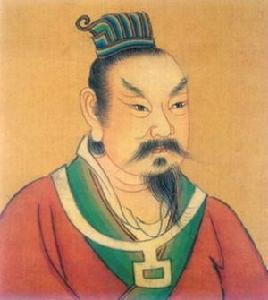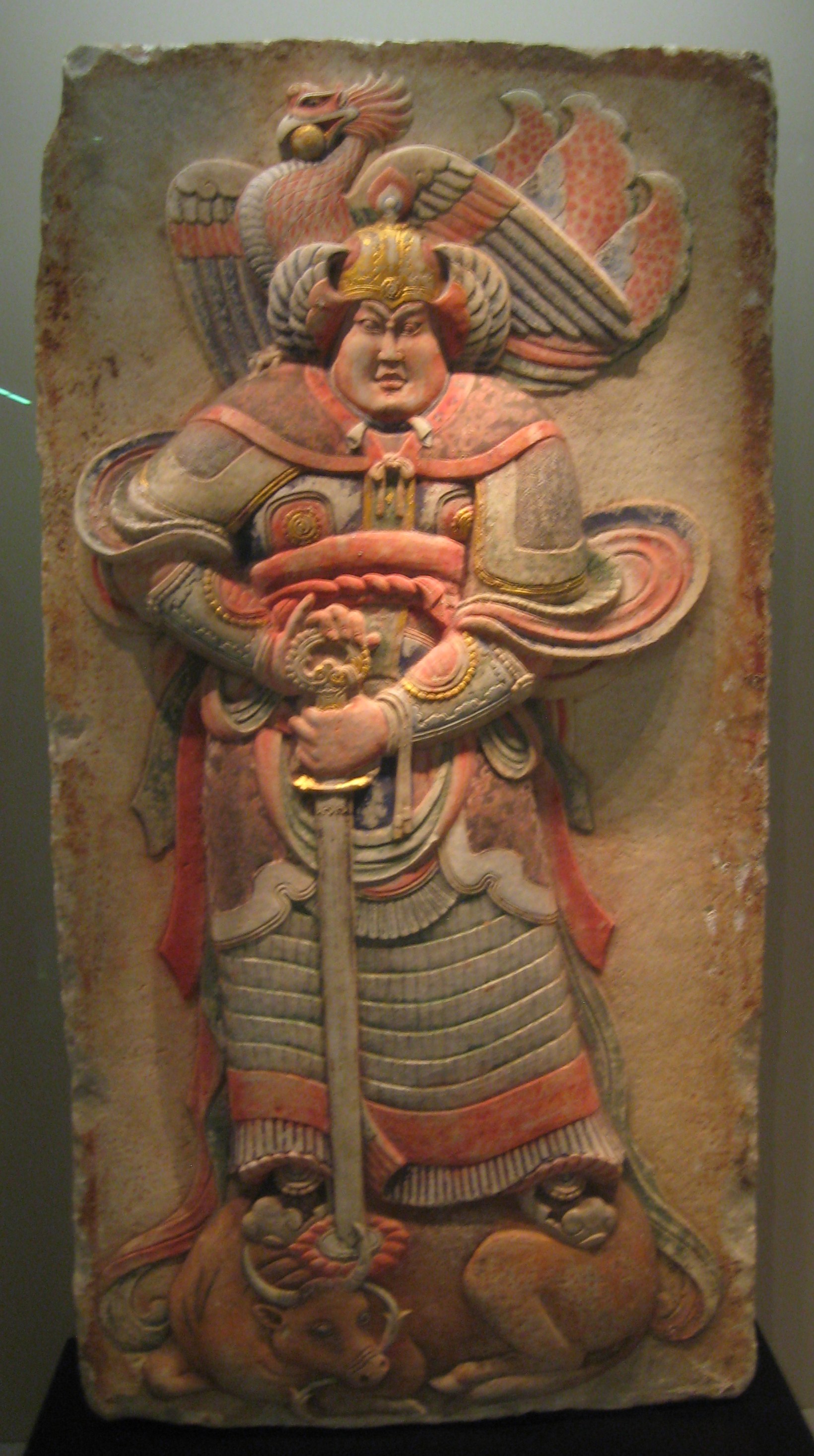|
Pang Shigu
Pang Shigu was a general of the warlord Zhu Wen (future emperor Taizu of Later Liang) in the period preceding the collapse of the Tang Dynasty of China. Pang first distinguished himself during Zhu Wen’s campaigns against the rebels Huang Chao and later Qin Zongquan. Following this he gained more important positions and eventually the leadership of a full army. He successfully defeated and killed Shi Pu, governor of Ganhua and a powerful enemy of Zhu Wen. However when given command of an invasion of the territory of warlord Yang Xingmi he was defeated and killed by Yang at the Battle of Qingkou The Battle of Qingkou was a battle fought in 897 during the period of constant warfare in China that preceded the collapse of the Tang dynasty. The battle was fought between armies loyal to the warlords Zhu Quanzhong (Zhu Wen) and Yang Xingmi, wit .... References Tang dynasty people killed in battle Chinese generals {{Improve categories, date=January 2021 ... [...More Info...] [...Related Items...] OR: [Wikipedia] [Google] [Baidu] |
China
China, officially the People's Republic of China (PRC), is a country in East Asia. It is the world's most populous country, with a population exceeding 1.4 billion, slightly ahead of India. China spans the equivalent of five time zones and borders fourteen countries by land, the most of any country in the world, tied with Russia. Covering an area of approximately , it is the world's third largest country by total land area. The country consists of 22 provinces, five autonomous regions, four municipalities, and two Special Administrative Regions (Hong Kong and Macau). The national capital is Beijing, and the most populous city and financial center is Shanghai. Modern Chinese trace their origins to a cradle of civilization in the fertile basin of the Yellow River in the North China Plain. The semi-legendary Xia dynasty in the 21st century BCE and the well-attested Shang and Zhou dynasties developed a bureaucratic political system to serve hereditary monarchies, or dyna ... [...More Info...] [...Related Items...] OR: [Wikipedia] [Google] [Baidu] |
Zhu Wen
Emperor Taizu of Later Liang (), personal name Zhu Quanzhong () (December 5, 852 – July 18, 912), né Zhu Wen (), name later changed to Zhu Huang (), nickname Zhu San (朱三, literally, "the third Zhu"), was a Chinese military general, monarch, and politician. He was a ''Jiedushi'' (military governor) and warlord who in 907 overthrew the Tang dynasty and established the Later Liang (Five Dynasties), Later Liang as its emperor, ushering in the era of the Five Dynasties and Ten Kingdoms. The last two Tang emperors, Emperor Zhaozong of Tang (Li Jie) and Emperor Ai of Tang (Li Zuo), who "ruled" as his puppets from 903 to 907, were both murdered by him. Zhu Wen initially served as a general under the rebel Huang Chao, but defected to the weakened Tang dynasty in 882. Taking advantage of the total chaos in the wake of Huang Chao's defeat, Zhu Wen was able to conquer parts of central China after destroying warlords such as Qin Zongquan, Shi Pu, Zhu Xuan, and Zhu Jin, although most ... [...More Info...] [...Related Items...] OR: [Wikipedia] [Google] [Baidu] |
Later Liang (Five Dynasties)
Liang, known in historiography as the Later Liang () (1 June 907 – 19 November 923) or the Zhu Liang (), was an imperial dynasty of China and the first of the Five Dynasties during the Five Dynasties and Ten Kingdoms period. It was founded by Zhu Wen (Emperor Taizu), after he forced the last emperor of the Tang dynasty to abdicate in his favour (and then murdered him). The Later Liang would last until 923 when it was destroyed by the Later Tang dynasty. Formation Zhu Wen initially allied himself as Huang Chao's lieutenant. However, he took Huang's best troops and established his own power base as a warlord in Kaifeng. By 904, he had exerted control over both of the twin Tang Dynasty capitals of Chang'an and Luoyang. Tang emperor Zhaozong was ordered murdered by Zhu in 904 and the last Tang emperor, Ai Di (Emperor Ai of Tang), was deposed three years later. Emperor Ai of Tang was murdered in 908, also ordered by Zhu. Meanwhile, Zhu Wen declared himself emperor of the new ... [...More Info...] [...Related Items...] OR: [Wikipedia] [Google] [Baidu] |
Tang Dynasty
The Tang dynasty (, ; zh, t= ), or Tang Empire, was an Dynasties in Chinese history, imperial dynasty of China that ruled from 618 to 907 AD, with an Zhou dynasty (690–705), interregnum between 690 and 705. It was preceded by the Sui dynasty and followed by the Five Dynasties and Ten Kingdoms period. Historians generally regard the Tang as a high point in Chinese civilization, and a Golden age (metaphor), golden age of cosmopolitan culture. Tang territory, acquired through the military campaigns of its early rulers, rivaled that of the Han dynasty. The House of Li, Lǐ family () founded the dynasty, seizing power during the decline and collapse of the Sui Empire and inaugurating a period of progress and stability in the first half of the dynasty's rule. The dynasty was formally interrupted during 690–705 when Empress Wu Zetian seized the throne, proclaiming the Zhou dynasty (690–705), Wu Zhou dynasty and becoming the only legitimate Chinese empress regnant. The devast ... [...More Info...] [...Related Items...] OR: [Wikipedia] [Google] [Baidu] |
Huang Chao
Huang Chao (835 – July 13, 884) was a Chinese smuggler, soldier, and rebel, and is most well known for being the leader of a major rebellion that severely weakened the Tang dynasty. Huang was a Salt in Chinese history, salt smuggler before joining Wang Xianzhi (rebel), Wang Xianzhi's rebellion in the mid-870s. After splitting with Wang, his army turned south and conquered Guangzhou. In 881, his troops captured the capital Chang'an, forcing Emperor Xizong of Tang to flee. Huang proclaimed himself the Qi emperor, but was defeated by the Tang army led by the Shatuo chieftain Li Keyong in 883 and forced to desert Chang'an. Following successive defeats, including to former subordinates Zhu Wen and Shang Rang who had surrendered to Tang, Huang was killed by his nephew Lin Yan (:zh:林言, 林言). Background The Tang dynasty, established in 618 A.D., had already passed its golden age and entered its long decline beginning with the An Lushan Rebellion by Turkic peoples, Turkic ge ... [...More Info...] [...Related Items...] OR: [Wikipedia] [Google] [Baidu] |
Qin Zongquan
Qin Zongquan (; died April 1, 889) was a Chinese military general, monarch, politician, rebel, and warlord during the Tang Dynasty. He was later a claimant to the imperial throne, in competition with Emperor Xizong of Tang and, later, Emperor Xizong's brother Emperor Zhaozong, with his capital at Cai Prefecture (蔡州, in modern Zhumadian, Henan). At Qin's prime, he controlled most of modern Henan and parts of modern Hubei, Anhui, and Jiangsu, but he was eventually repeatedly defeated by the Tang general and warlord Zhu Quanzhong. His subordinates turned against him and delivered him to the Tang capital Chang'an, where he was executed. Background and seizure of Cai Prefecture It is not known when Qin Zongquan was born. His family was from Cai Prefecture, which, at the start of his known career, was part of Zhongwu Circuit (忠武, headquartered in modern Xuchang, Henan), and Qin served as an officer at Zhongwu's capital Xu Prefecture ().''New Book of Tang'', vol. 225, part ... [...More Info...] [...Related Items...] OR: [Wikipedia] [Google] [Baidu] |
Shi Pu
Shi Pu (時溥) (d. May 9, 893Academia Sinicabr>Chinese-Western Calendar Converter''Zizhi Tongjian'', vol. 259.), formally the Prince of Julu (鉅鹿王), was a warlord of the late Tang dynasty, who controlled Ganhua Circuit (感化, headquartered in modern Xuzhou, Jiangsu) as its military governor (''Jiedushi''). He was eventually defeated by Zhu Quanzhong's general Pang Shigu (龐師古), and committed suicide with his family. Background and seizure of Ganhua Circuit It is not known when Shi Pu was born, but it is known that he was from Pengcheng and served as an officer at Xu Prefecture (whose seat was at Pengcheng).''Old Book of Tang'', vol. 182. Both he and fellow officer Chen Fan () were favored by Zhi Xiang () the military governor (''Jiedushi'') of Ganhua Circuit (感化, headquartered at Xu Prefecture).''Zizhi Tongjian'', vol. 254. In 881, after the agrarian rebel Huang Chao captured the imperial capital Chang'an, forcing then-ruling Emperor Xizong to flee, Zhi se ... [...More Info...] [...Related Items...] OR: [Wikipedia] [Google] [Baidu] |
Yang Xingmi
Yang Xingmi (; 852''Spring and Autumn Annals of the Ten Kingdoms''vol. 1 – December 24, 905Academia Sinicabr>Chinese-Western Calendar Converter''Zizhi Tongjian'', vol. 265.), né Yang Xingmin (楊行愍, name changed 886), courtesy name Huayuan (), formally Prince Wuzhong of Wu (吳武忠王, "martial and faithful"),Yang Xingmi's title of ''Wang'' (王) is translatable in English as either "prince" or "king." It will be largely translated as "prince" here as he made no attempt to claim his domain to be a state independent from Tang Dynasty, and it was not until the time of his son Yang Longyan (King Xuan), by which time the Tang imperial line had long been extinguished, that the Wu state formally declared itself independent, that the Wu rulers claimed the title of ''Guowang'' (lit., "state prince/king"). However, "king" will be used for the posthumous honors that Yang Longyan bestowed on him as Yang Longyan was then claiming the ''Guowang'' title. See ''Zizhi Tongjian'', vol. ... [...More Info...] [...Related Items...] OR: [Wikipedia] [Google] [Baidu] |
Battle Of Qingkou
The Battle of Qingkou was a battle fought in 897 during the period of constant warfare in China that preceded the collapse of the Tang dynasty. The battle was fought between armies loyal to the warlords Zhu Quanzhong (Zhu Wen) and Yang Xingmi, with Yang's army gaining victory. Background Starting with the reign of Emperor Muzong, the Tang dynasty of China began to decline. Regional military governors (jiedushi) began to gain more autonomy from the imperial government and eunuchs within the Tang court began to exercise more control over the emperor, especially after the Sweet Dew incident of 835. This meant the government was ineffective and local peasants began to get angry. In the year 874, following major floods in which there was very little government response, mass rebellions occurred throughout Tang China. The most successful of these rebellions was led by Huang Chao, who captured the capital and declared himself emperor in 881. Huang was eventually defeated but the imper ... [...More Info...] [...Related Items...] OR: [Wikipedia] [Google] [Baidu] |
Tang Dynasty People Killed In Battle
Tang or TANG most often refers to: * Tang dynasty * Tang (drink mix) Tang or TANG may also refer to: Chinese states and dynasties * Jin (Chinese state) (11th century – 376 BC), a state during the Spring and Autumn period, called Tang (唐) before 8th century BC * Tang dynasty (唐; 618–907), a major Chinese dynasty * Later Tang (唐; 923–937), a state during the Five Dynasties and Ten Kingdoms period * Southern Tang (唐; 937–975), a state during the Five Dynasties and Ten Kingdoms period Food * Tang (drink mix), a brand name of instant fruit flavored drinks, produced by Mondelēz International * Guk, soup or stew in Korean cuisine, sometimes known as "tang" Places Europe * Tang, County Westmeath, a village in Ireland * Tang, North Yorkshire, a settlement in England Asia * Tang, Ardabil, a village in Ardabil Province, Iran * Tang, Badakhshan, a village in Afghanistan * Tang, a village in Bumthang District, Bhutan * Tang (唐镇), a town in Pudong, Shanghai, Chi ... [...More Info...] [...Related Items...] OR: [Wikipedia] [Google] [Baidu] |




